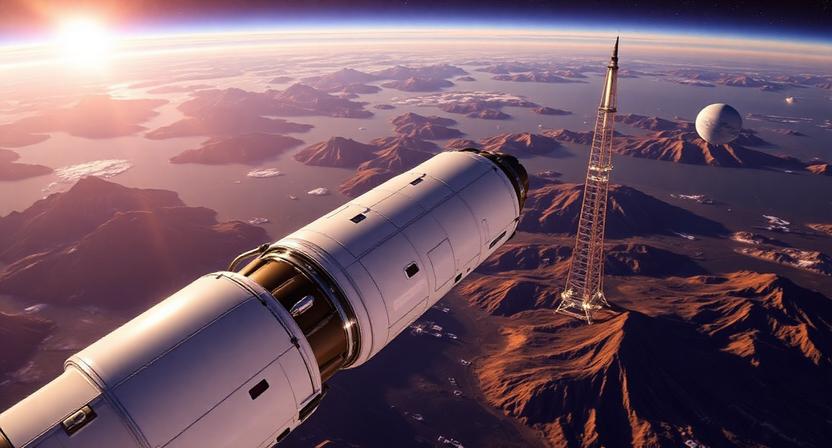Published on
November 17, 2025
China Aerospace Science and Technology Corp, or CASC, plans to start taking tourists to space starting with its first-ever commercial space tourism program, which could begin this summer of 2026. It would be a first of its kind, taking private passengers to the edge of space where they will experience weightlessness and a view of Earth from 100 kilometers above ground, crossing into the Karman line, which measures the boundary marking the edge of outer space. Ticket prices for these suborbital flights are estimated at 1 million yuan (US$140,534), making it an exclusive offer to wealthy individuals.
This is a major shift for China, which has been rapidly developing its space capabilities in recent years, including this foray into space tourism. While SpaceX and Blue Origin have made headlines so far for sending non-astronauts into space, China is gearing up to rival them in this emerging multi-billion-dollar industry.
Tourism Impact: Boosting China’s Commercial Space Industry
The launch of China’s space tourism program by CASC is expected to have a significant tourism impact not only in China but globally. Initially targeting high-net-worth individuals, the program will offer them a unique opportunity to experience space travel, marking China’s entrance into the lucrative market for private space tourism.
Beyond the immediate allure of space travel for the wealthy, this initiative will help foster the growth of China’s commercial space sector. The influx of tourists for space travel will likely spur the development of new infrastructure to support this high-end tourism experience, including spaceports, accommodation, and space-related services. Moreover, the global attention generated by such a program will enhance China’s global standing in the space race, attracting international attention and investment into its burgeoning space tourism industry.
As the program develops, there will be an economic ripple effect, benefiting sectors such as technology, hospitality, tourism services, and transportation. Local economies, particularly those near spaceports and tourism hubs, will see growth in business activity, job creation, and community development.
Shaping the Future of Space Tourism: Long-Term Economic Impact for China
The long-term economic impact of China’s space tourism program will be far-reaching. CASC’s initiative could pave the way for lower-cost space tourism options as the technology develops and demand increases. With the global space tourism industry expected to grow exponentially in the coming decades, China’s early entry into this market positions it as a major player in the future of commercial space activities.
As technology advances, the cost of space travel is expected to decline, making it more accessible to a broader range of people. This would unlock new segments of the market, from middle-income travelers seeking space experiences to corporate ventures incorporating space tourism into incentive programs. China, with its affordable ticket options, could cater to a global market seeking a once-in-a-lifetime experience.
Additionally, the space tourism program will likely open the door to a variety of adjacent industries. Beyond passenger flights, space hotels, orbital experiences, and longer-term space exploration could eventually become commercial realities, further expanding China’s footprint in space tourism and positioning the country as a leader in future space exploration efforts.
Developing Space Infrastructure for Long-Term Growth
As China’s space tourism sector expands, significant investments will likely go into space infrastructure, such as spaceports, launch facilities, and specialized technologies to support tourism flights. With the rapid pace at which China has developed rocket technologies and satellite launches, the infrastructure required for space tourism will be an area of focus, providing opportunities for private sector involvement and partnerships in the space economy.
Moreover, as space tourism grows, China’s tourism landscape will diversify, offering both luxury experiences in space and a broader variety of space-related tourism products, from suborbital flights to long-term space stays. These developments will drive future growth in the tourism sector, offering additional revenue streams for the country while promoting international collaboration in the growing space tourism industry.
Cultural and Scientific Impact: A New Frontier for Exploration
In addition to its economic potential, space tourism also offers cultural and scientific benefits. For China, the space tourism initiative could serve as a platform for showcasing its growing expertise in space exploration and space-related technologies. As private citizens travel to space, they will become ambassadors for China’s space program, helping to promote the country’s scientific advancements on the global stage.
The cultural impact of the program will also be significant, as it fosters global awareness of China’s space accomplishments, encouraging cultural exchanges through space travel. Space tourism can bridge cultural divides, offering a unique way to connect people from different backgrounds in the shared experience of space exploration.
Furthermore, the success of CASC’s space tourism program could spark greater interest in space research and education, encouraging young people to pursue careers in science, technology, and engineering. This could create a new generation of scientists and innovators in China and globally, contributing to the advancement of space exploration.
China’s Space Tourism Industry Poised for Growth
With CASC’s space tourism initiative set to launch, China is positioning itself as a key player in the emerging global space tourism industry. The short-term impact of the program will be on tourism and economic growth, while in the longer run, its potential for future impact will contribute to further advancing the frontiers of commercial space activities, more space infrastructure development, tourism products, and international cooperation.
By continuing to develop its space tourism, China will pave the way for other future space-related innovations and access to space at more affordable rates. The country’s foray into this industry is likely to set the stage for further future space exploration ventures and contribute to shaping a new era of space tourism that will be accessible, sustainable, and scientifically enriching. With this, the prospects for space travel look bright, while China’s role in this budding industry will continue to expand and provide lasting economic, scientific, and cultural benefits.
